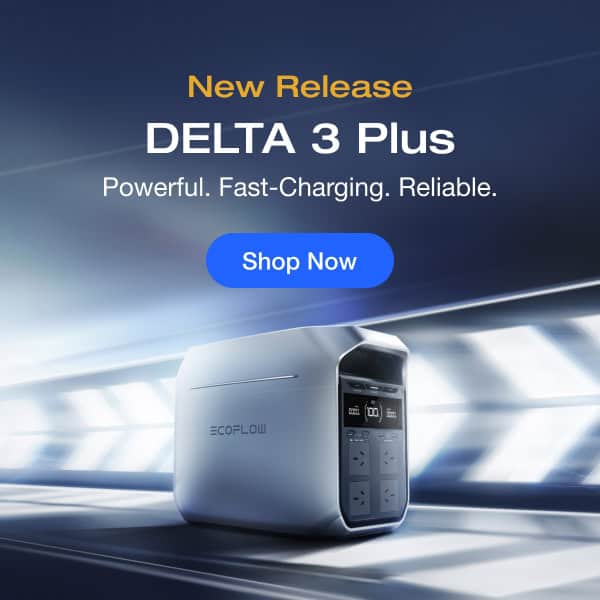Now more than ever, you should invest in the energy security of your home. With extreme weather events on the rise and ageing infrastructure frequently interrupting essential systems, it’s only a matter of time before your home experiences a blackout.
Will you be prepared when it happens?
An investment in backup power for your home is a simple, effective way to ensure your family’s safety, even during an extended power outage. Deciding what type of backup battery system you need is the first step.
From there, you can decide if you’re ready to upgrade your battery storage to a solar generator by pairing it with solar panels.
How Does Battery Storage Work?
Battery storage is an essential component of any off-grid residential power system. But an uncharged battery won’t do you much good. A battery is essentially an empty vessel. For it to be useful, you need to fill it. This process can occur in various ways.
If you have a portable power station that supports solar charging, you can add solar panels to capture clean, renewable solar energy — a cost-effective, accessible way to generate electricity for later use in your battery. Solar panels generate electricity from the sun and run it through an inverter and balance of system to store it in a solar battery.
But there are other ways to charge your batteries as well. For example, most batteries can recharge by simply plugging them into a wall or car outlet. How long the battery will retain a full charge depends on the battery chemistry and other factors.
However you charge it, a home backup battery system gives you freedom, flexibility, and autonomy in accessing your energy supply — independent of the grid.
Does a Storage Battery Work Without Solar Panels?
A storage battery can work without PV panels. However, this is only true if you have a different way to charge your battery.
For instance, the EcoFlow RIVER 2 Pro portable power station is compatible with AC (wall outlet) charging, car charging, USB-C charging, and solar panels.
Some portable power stations — such as the DELTA Pro — are compatible with even more charging options. You can charge it at an EV charging station or with a Smart Dual-Fuel Generator. You can also expand the DELTA Pro with Smart Extra Batteries and create a whole-home backup power solution.
Multiple charging options give you ultimate flexibility and mean your power station can stay fully charged and ready to go, even during an extended power outage.
Can You Add Solar Panels to Your Battery at a Later Date?
If your home backup battery or portable power station supports solar charging, you can add solar panels at a later date. You can often purchase power stations as standalone products or in all-in-one bundles that include PV panels. For example, EcoFlow’s DELTA 2 is a portable power station that comes without solar panels, but you can add them later.
You can mix and match the variety of solar panels available through EcoFlow, which have universal compatibility even with third-party batteries. Just be sure to double-check compatibility with different brands and between the solar panels and battery if you buy them separately.
You can also mix and match various panels for different situations, such as by installing rigid PV panels on your roof and getting another set of portable panels for camping. The universal design lets you connect them all to the same battery.
What Are the Benefits of a Lone Storage Battery?
On the fence about what to purchase first? Here are some benefits of buying a storage battery on its own.
Lower Upfront Cost
While solar energy technology costs are decreasing, investing in a lone storage battery can save you some cash upfront. You can still benefit from access to backup power in an emergency without the need to come up with the funds to invest in an entire home solar energy system. However, you’ll need to connect to the grid or use a different means to charge your battery, meaning you have fewer options in the event of a blackout.
Government Incentives
Even if you only purchase a power station on its own, you may still qualify for tax breaks and other government incentives.
While this can lead to substantial savings, you could save even more and have the added benefits of renewable, autonomous energy if you invest in solar panels.
What Are the Benefits of Having a Backup Battery and Solar Panels?
Here are a few reasons to consider investing simultaneously in solar panels and battery storage.
Energy Independence
If your primary goal of investing in a power station is independence from the electric grid, then investing in solar panels is necessary. Without solar panels, you’ll still need to charge your battery with grid-dependent energy sources. To achieve full autonomy in your power supply, you need alternate ways, like solar panels, to charge up.
Long-Term Cost Savings
There is no denying that solar panels will increase your upfront cost when buying a backup power solution solar for your home. However, over time you could save substantially.
Solar energy is a free, renewable resource available year-round in most places, meaning you will massively reduce your energy spending. Plus, government incentives can reduce the upfront cost, making solar energy an attainable reality for many.
Better for the Environment
While renewable energy availability is rising, many electricity providers still rely on fossil fuels to generate electricity. Therefore, it’s hard to know if your energy is clean when plugged into the grid. Solar panels give you the peace of mind that you are not contributing to the harmful consequences of burning fossil fuels.
Emergency Preparedness
If you rely on the grid to charge your portable power station or home backup battery, what happens when the power goes out? When you use solar energy, you can charge up any time there’s sunlight, making solar power systems ideal for long-term power outages and unexpected emergencies.
Frequently Asked Questions
You can use many solar batteries without solar panels. However, this is not a two-way street. To use solar panels and inverters for generating off-grid power, you need a battery to capture and store electricity for future use.
Final Thoughts
Having a backup power source is a necessity for keeping your family safe in the event of a blackout. Having a backup power source that uses solar power is even better.
Whether you’re adding solar panels to a previously bought power station or shopping for the whole package, EcoFlow is here to help.


